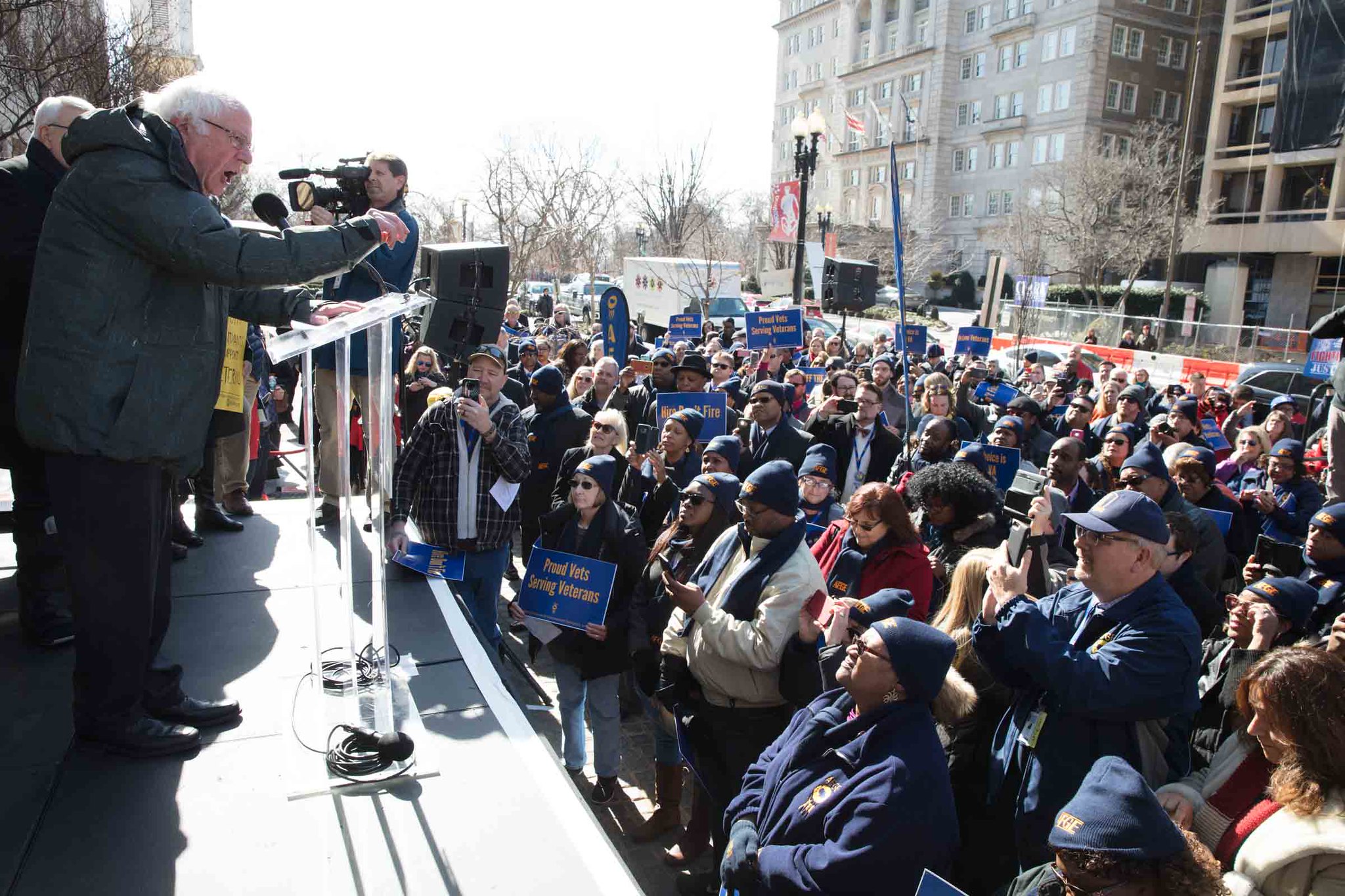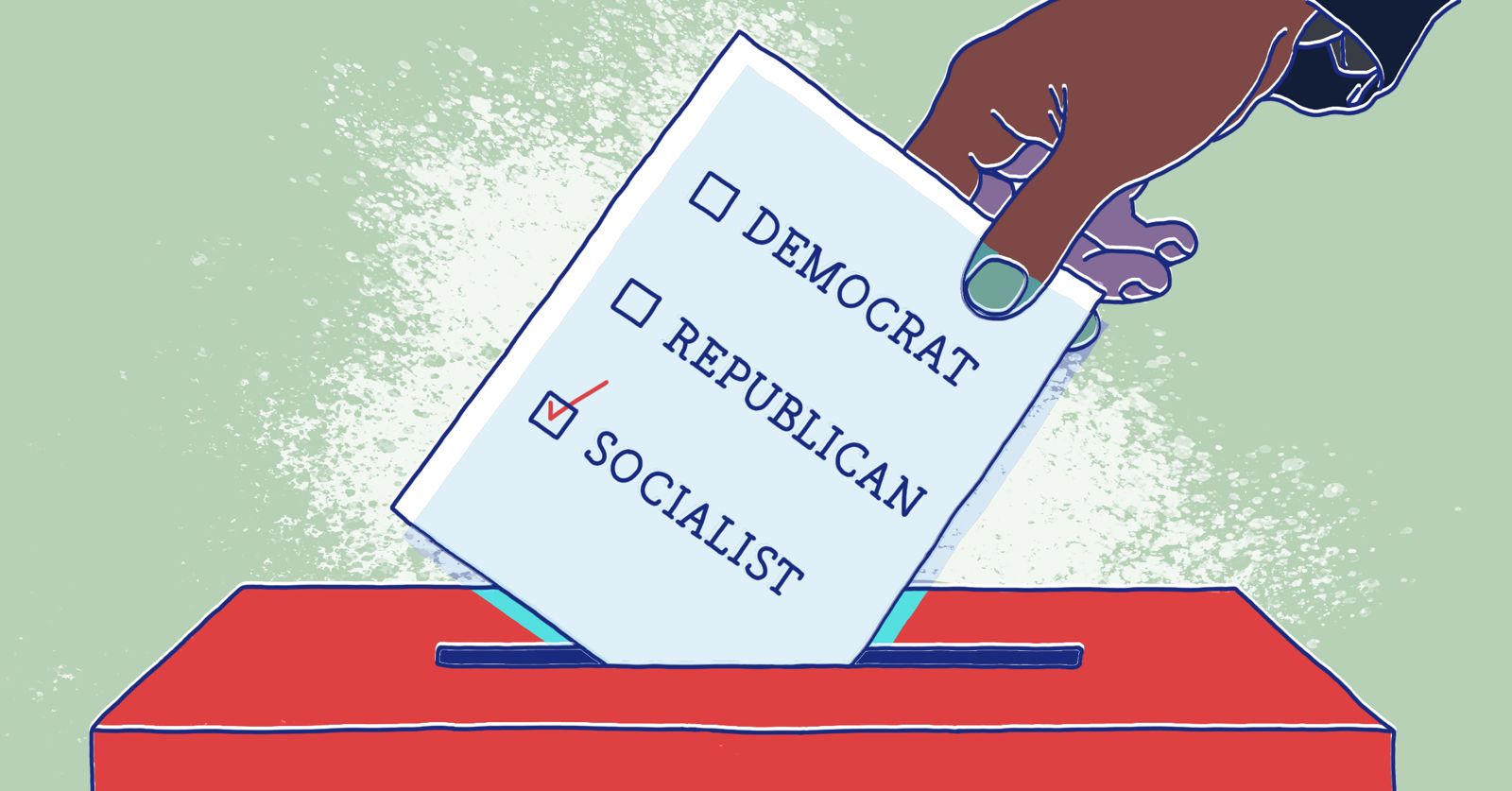The past two years have proven that the electoral arena is an essential battleground for socialists but have also raised strategic questions for how DSA should engage in elections. Everything we do, including elections, should work to improve the ability of our class, the working class, to understand our class interests and fight for ourselves. Going forward, therefore, DSA should carry out class-struggle electoral campaigns with an aim to create an independent political organization of the working class.
After Bernie’s groundbreaking 2016 campaign and the victories of socialist candidates around the country largely on the Democratic ballot line, there’s a strong temptation for socialists to run up the scoreboard by lending support to as many progressives and “Berniecrats” as possible. Sometimes, socialists also buy into the illusion that they can even change the Democratic Party.
But this approach, to reform and “realign” the Democratic Party, misunderstands where our power comes from. It would misdirect the organic working-class militancy that has been slowly growing since the 2008 financial crisis and would undermine our movement toward socialism.
History is littered with instances of working-class power being channeled into the Democratic Party apparatus and ultimately burned out by those who actually control the party — not the internal formations within the party institutions but the donors. The way the Democratic Party is structured always grants the rich effective veto power over attempts to turn the party in a more social-democratic direction, much less a socialist one.
More importantly, if DSA were to support any and all progressive “Berniecrats” who run to the Left of centrist Democrat candidates, we would be misunderstanding how working people can use elections strategically to win the future we deserve. The belief that we can legislate socialism, or even social democracy, from above — often referred to as “electoralism” — proved to be a failed strategy throughout the 20th century because it did not take into account the real source of our power as working people.
In contrast to an electoralist approach that takes the sole approach of electing “good candidates” to change things for the better from above, we must advocate for a class-struggle electoral strategy premised on a very simple notion: the primary goal for socialists engaging in the electoral realm should be to organize and empower the working class, not to support professional or career politicians and rely on them to deliver reforms from above.
Of course, our movement needs critical legislative reforms to shift the balance of power toward the working class and to help us organize. Winning universal social programs like Medicare for All and a Green New Deal are critical steps on the democratic road to socialism. But the power to win and defend these reforms rests solely on the power, militancy, and organization of the working class. Our power to change the world comes from the working class as the agent of change — bottom up, not top down. Our class-struggle approach to elections is linked to our support for the rank-and-file strategy to transform the labor movement into a militant and democratic fighting force that. A renewed labor movement, paired with class-struggle candidates, can lead the fight to win the world we want to see.
DSA’s Bread & Roses caucus is sponsoring Resolution #31 (“Class-Struggle Elections”) at DSA’s 2019 convention because we want DSA to embark on a serious effort over the next two years to support class-struggle candidates who see themselves as organizers first and legislators second. Class-struggle politicians are those who will raise the expectations of working-class people, unite everyone against a common capitalist enemy, and promote working-class movements and organization.
On a national level, Bernie (and to an extent, Alexandria Ocasio-Cortez) has played the role of a class-struggle candidate and officeholder. Bernie’s 2016 campaign put universal social programs like Medicare for All and College for All on the agenda. He recently rolled out an anti-endorsements list that demonstrates his continued willingness to name and shame capitalist enemies that are responsible for so much working-class suffering. And more than ever, Bernie has used his 2020 campaign to support local grassroots movements like the fight to save Hahnemann hospital from venture capitalists.
We have other clear examples of class-struggle candidates too, including Jovanka Beckles — who ran for State Assembly in the East Bay in California — and the campaigns and tenures of the six socialist city council members who won this year in Chicago.
In the East Bay, Jovanka raised the expectations of working-class people with a groundbreaking platform that included a 36-hour workweek, universal suffrage for undocumented residents in state and local elections, and an ambitious social housing plan. To expose the capitalist support for her “progressive” opponent Buffy Wicks, East Bay DSA created the buffywicks.money website, which pulled back the curtain on Buffy’s ruling-class support. We showed the connection between Wicks’s lack of support for a charter-school moratorium or state-level, single-payer legislation and the capitalists pouring money into her campaign. Throughout the campaign, Jovanka showed up to every picket line throughout Assembly District 15 and spoke directly to striking workers to uplift their struggles against the boss and link her platform of democratic socialist demands to their fight for justice.
In Chicago, we’ve witnessed what class-struggle electoral strategy looks like in office. Carlos Ramirez-Rosa was Chicago’s lone socialist alderman for four years. In that time, he demonstrated how to use an elected office to stand up for and organize the working class in defiance of the political establishment, even when he was the lone voice on an issue to defend working-class constituents. He was the lone vote for example against building a $95 million Cop Academy, a position that got him kicked out of the council’s Latino Caucus. But Rosa’s vocal opposition galvanized organizing against the project citywide and brought energy and enthusiasm that helped elect five more socialists earlier this year.
These new aldermen are using their offices as organizing hubs and putting the issues of the day in a socialist political context through their words and actions. All of them in their campaigns identified landlords and developers, usually by name, as enemies of their working-class constituents. Rosa ran less against his nominal opponent than he did against Mark Fishman, a developer in his ward who bankrolled the opponent’s campaign and even bought the building housing Rosa’s ward office in order to evict him.
This use of an electoral platform to build the movement has not abated after the campaigns ended. Rossana Rodriguez, Byron Sigcho Lopez, and Rosa all organized Immigration Community Defense Brigades in preparation for the threatened ICE raids several weeks ago. They brought hundreds of people into their offices to help as well as to hear their alderman and neighbors explain the political context of draconian immigration policies.
Going up against the political establishment is an uphill battle for class-struggle candidates, but as the saying goes: They have money, we have people. That’s why DSA should formally adopt the class-struggle electoral strategy by passing Resolution #31 at the 2019 National Convention; class-struggle candidates running in the next two years will be able to harness DSA’s full support and power in hard campaigns against well-funded and connected machine politicians.
Resolution #31 will create a baseline of support that nationally endorsed candidates can expect to receive from DSA and institute a candidate pipeline to prepare the next generation of class-struggle candidates from inside our ranks. The only way we can hope to elect working people who will use their offices to organize the working class is by using our collective resources to make it happen.
Implementing this class-struggle electoral strategy on a national level for the next two years will build up our capacity to run and support more class-struggle electoral campaigns in the coming years. Most important, it will set us on a path toward building an independent working-class party: a workers’ party in the sense that it is controlled by its members — everyday working people, not billionaires — who democratically determine the party’s platform and ideology, who democratically select candidates to run on that platform, and who have mechanisms to discipline candidates so that they advance that platform or are removed from office.
A strategy premised on class struggle to build independent power, rather than one based on hopes for Democratic Party realignment, is the only way we can break the stranglehold of the ruling class over our two-party electoral system. For the working class to have a real shot at winning a world that’s truly run by and for the many, not the few, socialists need to take seriously the task of laying the groundwork now for an independent working class party. Adopting a class-struggle electoral strategy puts us squarely on that path and on the democratic road to socialism.




